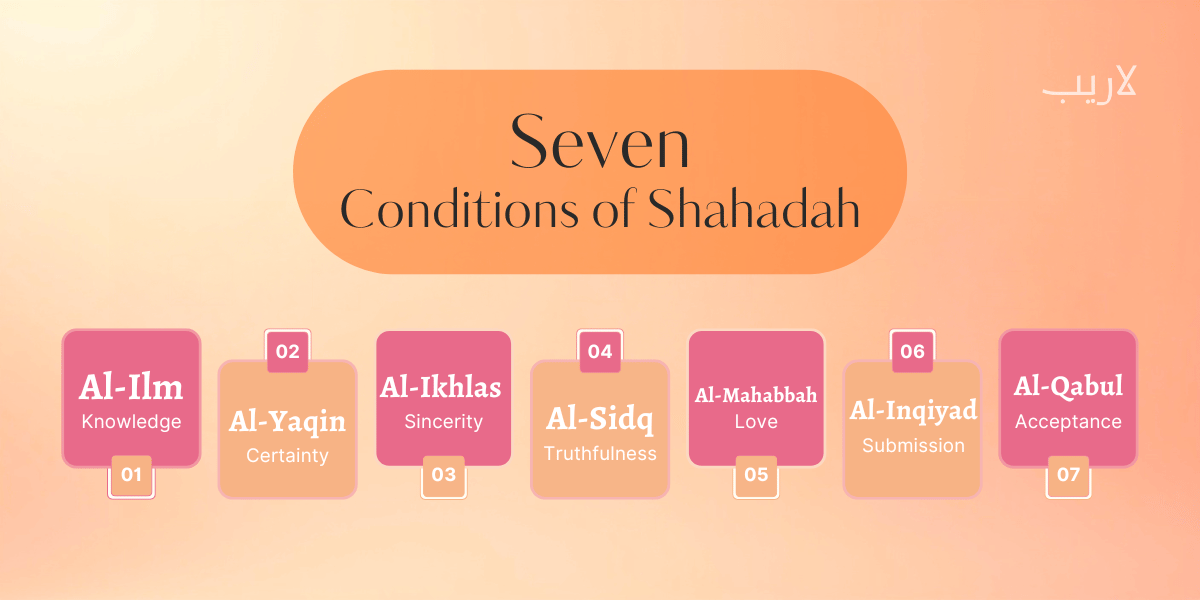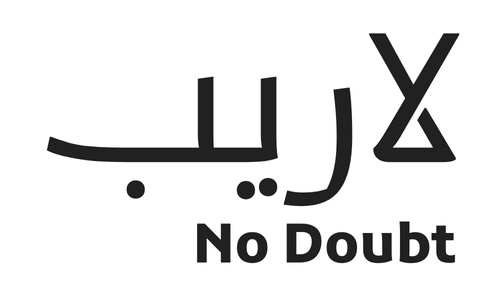The Shahadah: Understanding Islam's Foundational Declaration of Faith
بِسْمِ اللهِ الرَّحْمٰنِ الرَّحِيمِ
In the name of God, the Most Gracious, the Most Merciful.
The Shahadah is the heart of Islam. It is the first of the Five Pillars of Islam, and the sacred testimony that marks one’s entry into the faith. More than just a phrase, it is a profound declaration of belief, a lifelong commitment, and the very key to Paradise. It encapsulates the core message of Islam: the absolute Oneness of God (Allah) and the finality of His message through His messenger, Prophet Muhammad (صلى الله عليه وسلم). This single sentence, “أَشْهَدُ أَنْ لَا إِلَٰهَ إِلَّا ٱللَّٰهُ وَأَشْهَدُ أَنَّ مُحَمَّدًا رَسُولُ ٱللَّٰهِ” (Ash-hadu an la ilaha illa Allah, wa ash-hadu anna Muhammadan rasul Allah), is the bedrock upon which a Muslim’s entire life is built.
“Whoever says ‘La ilaha illallah’ (there is no god but Allah) and dies upon that, will enter Paradise.”
– Sahih al-Bukhari (1280), Sahih Muslim (26)
What is the Shahadah? The Testimony of Faith
The word “Shahadah” (ٱلشَّهَادَة) in Arabic literally means “to witness” or “to testify.” In the context of Islam, it is the solemn declaration of faith that serves as the foundation of a Muslim’s belief system. It is the first and most important of the Five Pillars of Islam, the framework of a Muslim’s life.
The complete Shahadah is:
In Arabic: أَشْهَدُ أَنْ لَا إِلَٰهَ إِلَّا ٱللَّٰهُ وَأَشْهَدُ أَنَّ مُحَمَّدًا رَسُولُ ٱللَّٰهِ
Transliteration: Ash-hadu an la ilaha illa Allah, wa ash-hadu anna Muhammadan rasul Allah.
English Meaning: “I bear witness that there is no deity worthy of worship except Allah, and I bear witness that Muhammad is the Messenger of Allah.”
To say the Shahadah with sincere belief and understanding is the single act that brings a person into the fold of Islam. The Prophet Muhammad (صلى الله عليه وسلم) emphasized its ultimate importance, saying,
“…None has the right to be worshipped but Allah’ and then later on he dies while believing in that, except that he will enter Paradise…”
Sahih al-Bukhari (Hadith 5827, Book of Riqaq).
This highlights its status as the key to salvation. Every prayer, every act of charity, and every Islamic practice rests on this core belief.
The Two Parts of the Shahadah: A Pillar of Two Halves
The Shahadah is a single, powerful sentence, but it is composed of two distinct and inseparable parts. Both must be accepted for one’s faith to be complete. These two parts are the pillars of Tawhid (Oneness of Allah) and Risalah (Messengership of the Prophet).
The First Part: Testifying to the Oneness of Allah (Tawhid)
The first part, La ilaha illa Allah (“There is no deity except Allah”), is the absolute foundation of Islam. It is a declaration of Tawhid, the belief in the indivisible Oneness of God. This concept is central to the entire Qur’an.
This statement is one of both negation and affirmation:
- Negation (“La ilaha”): It negates the existence of any other gods, idols, or figures worthy of worship. It frees the believer from superstition, from servitude to false deities, and from giving ultimate devotion to anything created, be it wealth, power, or even oneself.
- Affirmation (“illa Allah”): It affirms that the only one deserving of all worship, devotion, prayer, and submission is Allah – the Creator, the Sustainer, and the Master of the universe.
Allah says in the Qur’an what can be translated as,
“And your god is one God. There is no deity [worthy of worship] except Him, the Entirely Merciful, the Especially Merciful.”
Qur’an 2:163 (Surah Al-Baqarah, ayah 163).
Key Reflection: This first part of the Shahadah is a declaration of liberation. It liberates the human mind and heart, directing them towards the one and only source of peace and guidance.
- Tawhid al-Rububiyyah: Allah is the only Lord.
- Tawhid al-Uluhiyyah: Only Allah is worthy of worship.
Tawhid al-Asma wa al-Sifat: Allah’s names and attributes are unique.
The Second Part: Testifying to the Prophethood of Muhammad (Risalah)
The second part, wa ash-hadu anna Muhammadan rasul Allah (“and I bear witness that Muhammad is the Messenger of Allah”), completes the declaration. It affirms the principle of Risalah, or prophethood.
Accepting this part means believing that Prophet Muhammad (صلى الله عليه وسلم) is the final messenger sent by Allah to all of humanity. It is the practical method through which we learn how to live out the first part of the Shahadah. This belief entails:
- Obeying his commands: Following the guidance he brought as revealed in the Sunnah.
- Believing what he narrated: Accepting the information he conveyed from Allah and about the unseen.
- Worshipping Allah as he taught: Following his method of worship without adding or removing from it.
- Accepting him as the final prophet: Believing that no new prophet will come after him.
Allah confirms this link by saying,
“Whoever obeys the Messenger has truly obeyed Allah. But whoever turns away, then ˹know that˺ We have not sent you ˹O Prophet˺ as a keeper over them.”
Qur’an 4:80 (Surah An-Nisa, ayah 80).
This shows that the path to Allah is through the guidance brought by His final Messenger.
Key Reflection: This second part of the Shahadah provides the roadmap. It gives us the “how – to” for living a life of submission to Allah, ensuring our worship is correct, sincere, and accepted.
The Deeper Meaning and Importance of the Shahadah
The importance of the Shahadah extends far beyond a verbal utterance. It is a contract with Allah that shapes a believer’s entire reality. It is the heaviest of all deeds on the scale on the Day of Judgment.
A famous hadith, known as the Hadith of the Card (Hadith al-Bitaqa- Reference: Jami` at-Tirmidhi 2639), illustrates this perfectly.
“Indeed Allah will distinguish a man from my Ummah before all of creation on the Day of Judgement. Ninety-nine scrolls will be laid out for him, each scroll is as far as the eye can see, then He will say: ‘Do you deny any of this? Have those who recorded this wronged you?’ He will say: ‘No, O Lord!’ He will say: Do you have an excuse?’ He will say: ‘No, O Lord!’ So He will say: ‘Rather you have a good deed with us, so you shall not be wronged today.” Then He will bring out a card (Bitaqah); on it will be: “I testify to La Ilaha Illallah, and I testify that Muhammad is His servant and Messenger.” He will say: ‘Bring your scales.’ He will say: ‘O Lord! What good is this card next to these scrolls?’ He will say: ‘You shall not be wronged.’ He said: ‘The scrolls will be put on a pan (of the scale), and the card on (the other) pan: the scrolls will be light, and the card will be heavy, nothing is heavier than the Name of Allah.”
Hadith al-Bitaqa- Reference: Jami` at-Tirmidhi 2639
The Shahadah is the ultimate source of purpose. It answers the fundamental questions of life: Who created us? Why are we here? And where are we going?
The Seven Conditions of the Shahadah

For the Shahadah to be truly transformative and accepted by Allah, classical scholars have outlined seven essential conditions based on the Qur’an and Sunnah. These conditions, knowledge, certainty, sincerity, truthfulness, love, submission, and acceptance, ensure that the declaration is not merely verbal, but firmly rooted in the heart and manifested in one’s actions. Scholars such as Ibn Rajab, Al-Nawawi, Ibn Taymiyyah, Ibn al-Qayyim, Al-Hafiz Ibn Hajar and Muhammad ibn Abd al-Wahhab.
Al-Ilm (Knowledge)
One must have basic knowledge of what the Shahadah means, both in its negation and affirmation. It is a testimony, and one cannot testify to something they are ignorant of. This knowledge removes any doubt or misunderstanding.
“So know [O Muhammad] that there is no deity except Allah…”
Qur’an 47:19 (Surah Muhammad, Ayah 19).
Scholar: Ibn Rajab al-Hanbali, in Jami‘ al-‘Ulum wa’l-Hikam.
Al-Yaqin (Certainty)
The belief must be firm and unshakable, free from any doubt. True faith is not based on guesswork but on a deep, heartfelt certainty in the truth of the Shahadah.
“The believers are only those who believe in Allah and His Messenger, then doubt not…”
Qur’an 49:15 (Surah Al-Ḥujurat, Ayah 15).
Scholar: Al-Nawawi, in his commentary on Sahih Muslim.
Al-Ikhlas (Sincerity)
The declaration must be made purely and solely for the sake of Allah, not for any worldly gain, social pressure, or personal desire. Allah commands,
“And they were not commanded except to worship Allah, [being] sincere to Him in religion, inclining to truth, and to establish prayer and to give zakah. And that is the correct religion,”
Qur’an 98:5 (Surah Al-Bayyinah, Ayah 5).
Scholar: Ibn Taymiyyah, in Majmu‘ al-Fatawa.
Al-Sidq (Truthfulness)
This means saying the Shahadah truthfully, with a conviction that matches what is in the heart. It is the opposite of hypocrisy, where one might say it with their tongue but not believe it in their heart.
“Do the people think that they will be left to say, ‘We believe’ and they will not be tested?…”
Qur’an 29:2 – 3 (Surah Al-Ankabut, Ayahs 2 -3).
Scholar: Ibn al-Qayyim, in Madarij al-Salikin.
Al-Mahabbah (Love)
A believer must love the Shahadah and what it stands for. This implies loving Allah, His Messenger (صلى الله عليه وسلم), Islam, and the believers, while disliking all that opposes this declaration, such as disbelief and polytheism.
“…But those who believe are stronger in love for Allah…”
Qur’an 2:165 (Surah Al-Baqarah, Ayah 165).
Scholar: Al-Hafiz Ibn Hajar, in Fath al-Bari.
Al-Inqiyad (Submission)
This is the practical fulfillment of the Shahadah’s rights. It means submitting to Allah’s commands and the teachings of His Prophet (صلى الله عليه وسلم) in one’s actions. This is the physical manifestation of belief.
“And whoever submits his face to Allah while he is a doer of good…”
Qur’an 31:22 (Surah Luqman, Ayah 22).
Scholar: Imam al-Nawawi, in Sharh Sahih Muslim.
Al-Qabul (Acceptance)
One must accept the Shahadah with both the heart and the tongue, not rejecting or refusing its implications. This involves accepting the worship of Allah alone and forsaking the worship of everything else.
“For whenever it was said to them ˹in the world˺, “There is no god ˹worthy of worship˺ except Allah,” they acted arrogantly and argued, “Should we really abandon our gods for a mad poet?”
Qur’an 37:35 – 36 (Surah As-Saffat, Ayahs 35 to 36).
Scholar: Al-Imam Muhammad ibn Abd al-Wahhab, in Kitab al-Tawheed.
Summary Table:
| Condition | Meaning |
|---|---|
| Al-‘Ilm (العلم) | Knowledge |
| Al-Yaqin (اليقين) | Certainty |
| Al-Ikhlas (الإخلاص) | Sincerity |
| Al-Sidq (الصدق) | Truthfulness |
| Al-Mahabbah (المحبة) | Love |
| Al-Inqiyad (الانقياد) | Submission |
| Al-Qabul (القبول) | Acceptance |
How to Pronounce the Shahadah
For those new to Arabic, pronouncing the Shahadah may seem challenging, but Allah looks at the sincerity of the heart. A sincere attempt is what matters most. Here is a simple breakdown:
- Ash-hadu: (ash-HA-doo)
- an la: (an-LAA)
- ilaha: (ee-LAA-ha)
- illa Allah: (ill-all-LAH)
- wa ash-hadu: (wa-ash-HA-doo)
- anna Muhammadan: (an-na moo-HAM-mad-an)
- rasul Allah: (ra-SOO-lull-LAH)
The words in Arabic:
أَشْهَدُ أَنْ لَا إِلٰهَ إِلَّا اللهُ وَأَشْهَدُ أَنَّ مُحَمَّدًا رَسُولُ اللهِ
Transliteration:
Ashhadu an la ilaha illa Allah, wa ashhadu anna Muhammadan rasul Allah.
English meaning:
“I bear witness that there is no god but Allah, and I bear witness that Muhammad is the Messenger of Allah.”
It is highly recommended to listen to an audio recording from a reliable source or ask a Muslim to say it for you. Remember, perfect pronunciation is not a prerequisite for becoming a Muslim; the intention and belief behind the words are what count.
Sincerity is more important than perfect pronunciation. You can say the Shahadah in English if you do not know Arabic yet. For new Muslims, it is recommended to say the Shahadah with witnesses (but this is not a requirement for validity).
The Shahadah in a Muslim's Daily Life
The Shahadah is not just something a Muslim says once. It is at the center of a Muslim’s daily life. Muslims hear it five times a day in the Adhan, which is the call to prayer. They also repeat it in every prayer during the sitting part, known as Tashahhud.
The meaning of the Shahadah shapes daily choices and actions. When a Muslim chooses honesty instead of lying, shows patience instead of anger, or gives to others instead of being selfish, they are living by the Shahadah. It is a reminder to live with honesty, purpose, and obedience to Allah, making even ordinary actions a part of worship.
Explaining the Shahadah to Children

Introducing the most important concept in Islam to children requires simplicity, creativity, and love. The goal is to plant a seed of understanding that can grow with them.
Using Simple Stories and Visual Aids
Children learn best through stories and analogies.
- For “La ilaha illa Allah”: You can tell a story about a ship. “Imagine a ship in a big ocean. If it has two, three, or even four captains all trying to steer in different directions, what would happen? It would crash! For the ship to be safe, it needs only one great captain. Our whole world is like a giant ship, and its one and only Captain is Allah.”
- For “Muhammadan rasul Allah”: You can use the analogy of a special messenger (postman). “Allah, our Creator, has a very important message for us that tells us how to be happy and get to Paradise. He chose the best and most trustworthy man, Muhammad (صلى الله عليه وسلم), to be His special messenger to deliver this message to us perfectly.”
Fun Activities: Worksheets and Printables
Making learning interactive is key. Consider creating simple, engaging activities for your children.
- Coloring Pages: Offer printables of the Shahadah in beautiful Arabic calligraphy for them to color.
- Matching Games: Create a worksheet where they match the Pillars of Islam to their pictures, with the Shahadah being number one.
- Crafts: A simple craft could be making a “Key to Jannah” out of cardboard and decorating it with the words “La ilaha illa Allah.”
Key Reflection: The Shahadah as a Lifelong Compass
The Shahadah is far more than the entry point to Islam; it is the central axis around which a believer’s entire life revolves. It is a declaration of freedom from the servitude of the created world and a commitment to the service of the Creator. It is a source of immense peace, providing a clear identity, a noble purpose, and an unwavering moral compass.
To say it is to plant a seed. To understand its conditions is to water it. And to live by it is to watch it grow into a mighty tree of faith, providing shade, comfort, and guidance throughout the journey of life and into the hereafter.
Every act of worship, every act of kindness, and every struggle for self-improvement is powered by this testimony.
“Say: ‘Indeed, my prayer, my sacrifice, my living and my dying are for Allah, Lord of the worlds.”
Qur’an 6:162 (Surah Al-An‘ām, Ayah 162)
Download Your Checklist
One-page Shahadah checklist, seven conditions and your first steps (wudu, Salah, qiblah, prayer times), with space for notes.
Frequently Asked Questions - Shahadah
1. What is the reward for saying the Shahadah?
The Prophet (صلى الله عليه وسلم) said: “Whoever says ‘La ilaha illa Allah’ sincerely will enter Paradise.” (Bukhari)
2. I am convinced Islam is the truth. How do I officially say the Shahadah and become a Muslim?
To become a Muslim, one simply needs to say the Shahadah with sincere belief and understanding. It is best to perform a simple purification ritual first, known as ghusl (a full-body bath or shower), with the intention of embracing Islam. Then, you pronounce the words of the Shahadah. There is no other “official” ceremony required.
3. Do I need witnesses to say the Shahadah?
While it is highly recommended to say the Shahadah in the presence of at least two Muslim witnesses, it is not a requirement for its validity between you and Allah. Your sincere declaration is enough.
4. What if I cannot pronounce the Arabic words perfectly?
Allah knows what is in your heart. Say it to the best of your ability. The sincerity and belief behind your words are what matter most.
5. I have said the Shahadah. What are the most important next steps?
Learn how to perform the five daily prayers (Salah), seek knowledge, connect with a local mosque, and begin living according to your new faith step by step.
6. What if I commit a sin after saying the Shahadah? Is it nullified?
No. The Shahadah is not nullified by sins. Repent sincerely, and Allah’s mercy is always open. Only acts of disbelief can nullify faith.
7. Do I have to change my name?
No. Only if your name contradicts Islamic beliefs. Otherwise, it’s optional.
8. Can a woman say the Shahadah while on her menses?
Yes, she can. Menstruation does not prevent her from declaring faith.
9. What is the difference between the Shahadah and the Kalima?
The Shahadah is the core declaration of faith. Kalima may refer to additional affirmations but is often used interchangeably.

